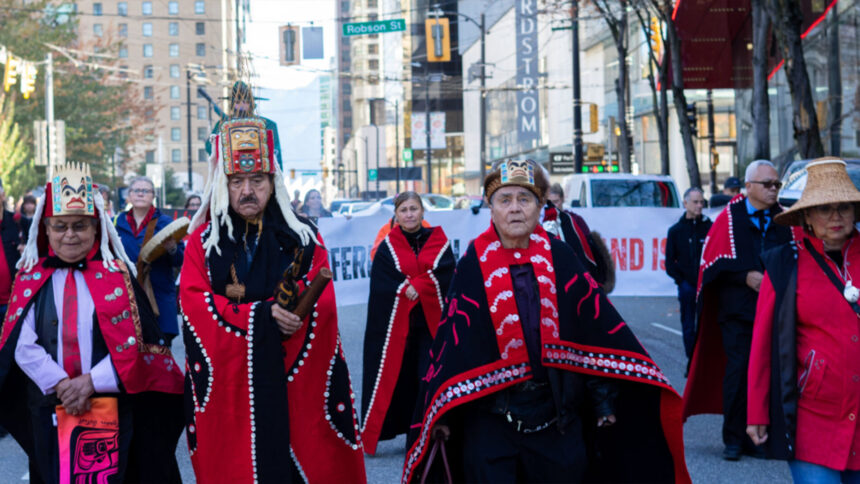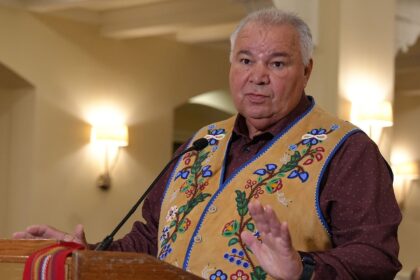As the federal government was still pondering Bill C-5 to expedite major projects at the end of June, 12 Gitxsan hereditary chiefs in British Columbia launched an awareness campaign to highlight Gitxsan Ayook (laws) and their role in guiding responsible land development and fostering self-determined economic growth on Gitxsan Laxyip (traditional land). “It’s still not really understood about our traditional hereditary system. It’s still alive and well…,” Hereditary Chief Simoogit Geel Catherine Blackstock tells APTN News. “Hereditary, matrilineal-the authority belongs to the chief over their land. There’s up to 60 house groups in the Gitxsan Nation and the chiefs are the real authority. That’s our laws.” The 12 chiefs say in a news release that they “recognize that upholding ayook is crucial for preserving unique Gitxsan culture, traditions and sanctity” of their traditional land. “For generations, our responsibility has been to ensure a thriving future for the huwilp (Gitxsan houses) and the Gitxsan people,” says Blackstock. “This means protecting our land, our culture, and our way of life while also building an economically strong nation.” According to the news release the Gitxsan Nation has presided over 35,000 square kilometres of Gitxsan Laxyip in northwestern British Columbia since time immemorial. “Respect for these laws is essential to true reconciliation and the survival of our way of life,” says another Hereditary Chief Simoogit Gwiiyeehl, Brian Williams. In recent months, hereditary and elected chiefs have criticized the lack of consultation by federal and provincial governments when they consider major pieces of legislation that could impact First Nation territories and peoples. That includes Bill C-5-known as the Building Canada Act and the similar Bills 14 and 15 in British Columbia. Bill 15 was brought in by the B.C. government-as it said such a bill is needed to speed up public and private infrastructure projects in the face of tariff threats from the United States, while Bill 14 would pare down the permitting process for renewable energy projects. First Nations want the bills withdrawn or revised, saying they infringe on the constitutional rights of consultation for First Nations. Asked about the federal government seemingly wanting only to negotiate with a national body like the Assembly of First Nations, Blackstock was blunt. “The government is wrong,” says Blackstock. “You have to go by the individual nations and whoever these authorized people are-that’s who should be sitting at the table-that’s who they should be meeting with.” Blackstock says for the Gitxsan Nation, authorized people are only the hereditary chiefs. “This is important so that our culture continues to thrive and government has a long way to go. Industry, I find, is actually more open and willing to do things than government. Government puts a bill through and says ‘now we’ll talk to you’- that’s not how it should happen.” The Gitxsan Nation is not under the Indian Act and doesn’t receive money from the federal government. Blackstock says that’s an important distinction to make in educating members and the public about their hereditary system. “Nowadays, more than half of us are living away from our homes, so there’s a disconnect. And there’s a disconnect because of people who were apprehended-so they may not be aware of our laws,” Blackstock says. “But when the government or industry comes knocking at our door-we are the ones who are still standing there no matter what. We don’t need funding or any backing or anything. We will be there to protect our laxyip.” Blackstock says being at the table “we can maybe make things happen.” “Work through some of the environmental issues, the social issues, the cultural issues (and) get people out on the land. Colonization has done a number and we need to reverse that.” Continue Reading
Gitxsan hereditary chief says the federal government is wrong not to consult individual First Nations

Leave a Comment










